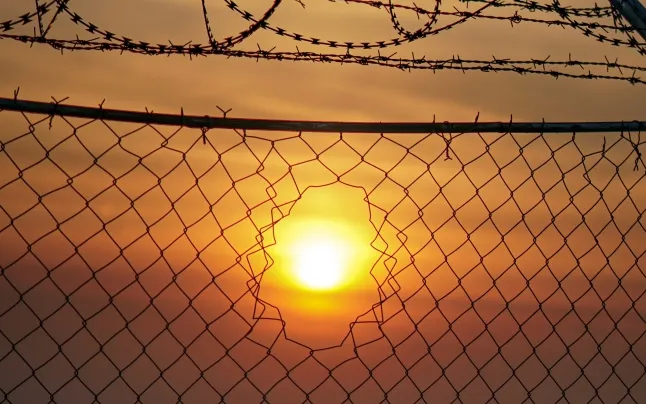The organisation highlights the lethal consequences of the necropolitical boundary in a report entitled 'Monitoring the Right to Life - 2022’.
Ensuring the right to life and putting it at the centre should be the duty and purpose of any migration policy. Unfortunately, this objective is far from being a priority for many governments, including Spain, which chooses to focus on datum from people who leave the African coast and reach Spanish territory in order to reinforce a migration control logic that aims to demonstrate the ability to control the area.
The result of all this, apart from fuelling the speeches of fear and hatred, can only be translated into dramatic figures, such as those set out by the NGO Caminando Fronteras in the report 'Monitoring the Right to Life - 2022’. According to the entity, at least 2,390 people died or disappeared while trying to reach Spain last year. The text also notes the increasingly deadly trend of migration routes to Spain in recent years, where more than 11,500 people have lost their lives between 2018 and 2022.
“He left with other young people from the village because they could no longer live here; they all went out on the same boat, and we searched for them, but they still do not appear. Many parents are left without children." This testimony by the father of a young Malian who set out on the road to Europe is one of those gathered in the report by Caminando Fronteras, which demonstrates the tragedy that thousands of families are experiencing.
Death policies that configure deadly migration routes
They are the victims of the necropolitics applied to the western Euro-African border. From the more than 2,300 victims on their way to Spain last year, a figure slightly higher than those in 2020, the entity informs that there were 288 women and at least 101 children. However, this information is far from the deaths recorded in 2021, which increased to 4,639, as a result of the “rise due to the exponential increase in the use of the Canary Route”, the report specifies.
For the fourth year running, the organisation has highlighted the Canary Route as the most lethal, with more than 1,780 victims counted. The entity points out that “its physical characteristics, the fact that the ships that are too weak for the ocean, the long distances, and the political relations between countries in the area subject to maritime and land interests make it difficult to cooperate to defend the right to life between countries, or to have delays in activating rescue services”.
The high mortality of the Canary Route (also called the Atlantic Route) places it well above others such as the Algerian Route (464 victims), "which is systematically invisibilized", alerts the report; the Alborán Route (75); the Terra Route (42) and the Strait of Gibraltar Route (25). As Caminando Fronteras affirms, this information is a consequence of “migrating policies that make it difficult, by obstructing or directly omitting, to put in place rescue mechanisms for the lives of migrants”.
Another piece of information that highlights the document and exacerbates the pain of families, is that 91.4% of the victims of these migration pathways die without their bodies being found or identified, which has "a terrible impact on their families and communities for the impossibility of completing mourning, as well as for the legal and psychological implications”.
“My friend’s son left on 9 November with twenty more people from Bumerdés, and we haven’t heard from him since...his father and brother call me constantly, several times a day, asking if any boats have arrived; it has been a long time, something must have happened,” says another witness of a community leader in charge of the search of a missing young man, collected in the report. In this regard, the study explains that, throughout 2022, a total of at least 64 ships have disappeared with all their crews on board.
Women and children, the most exposed to border violence
'Monitoring the Right to Life - 2022’ also stops at the origin of the victims of this policy of death at the borders, as it helps to explain in some way their migratory history and the reasons that drove them out of their countries. We are talking about causes such as war conflicts, neo-colonial extractivist policies, poverty, male violence or LGBTI phobia, among others.
Thus, according to the report, people of twenty-five nationalities lost their lives in 2022 trying to reach the Spanish coast, the vast majority of them coming from the African continent. Analyzing their origin "allows the analysis of migratory journeys and the impact of the violence people face during the journeys themselves”, is expressed in the report.
As usual, women and children suffer the most during these migration processes, which all too often end in death. Among the violence to which they are subjected, Caminando Fronteras emphasizes sexual violence. Over the last few years has been implemented as a tool of torture in migratory control and as a systematic punishment for women who take these journeys. The organisation warns that security forces, their fellow travellers and other men from the countries they pass through are the ones who sexually abuse women.
The Melilla massacre, an example of the violent escalation of repression
The organisation also denounces the escalation of the militarisation of migratory control, which has resulted in the increasingly violent application of actions that systematically attack the human rights of migrants. As the clearest example of this trend, the massacre that took place in late June on the border of Melilla-Nador is remembered.
The event, widely censored by numerous human rights organizations, but downgraded to “a well-resolved Moroccan police action” by Spanish President Pedro Sánchez, ended in the deaths of forty people – twenty-three, according to official information – who lost their lives as a result of the use of “horror means of deterrence, such as bullets of fire, among others” by Spanish and Moroccan police.
“They massacred us, even when we were lying on the ground, powerless and on the edge of tiredness,” declared a victim of the tragedy, as the report states. Another confirms that they were "beaten and thrown tear gas on their faces", adding: "if you cried they continued to beat you, instead, if you were dead, you were left in peace." This “transnational violation of rights on the land border between Melilla and Nador”, laments the report, “remains unpunished” after the prosecution’s investigations into possible crimes by the Spanish police.









Add new comment